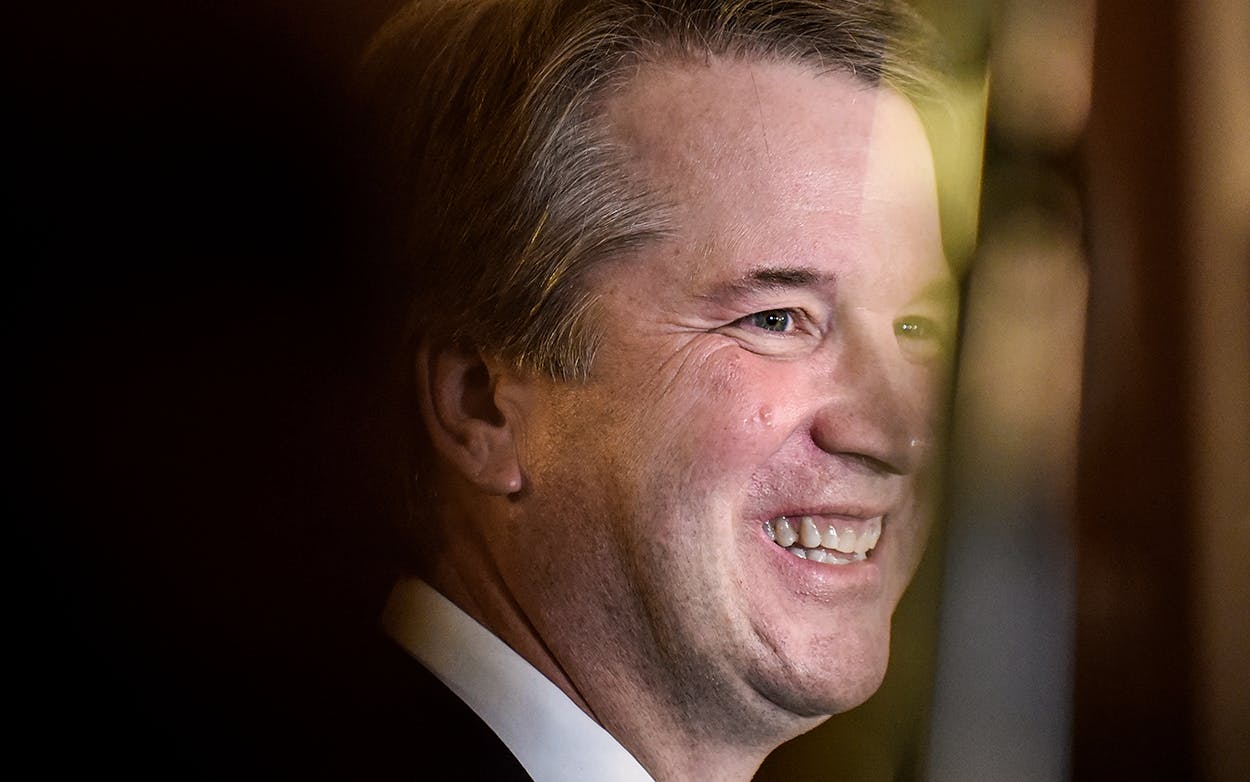A Texas court case involving an undocumented teen getting an abortion is now being scrutinized as a barometer of the judicial temperament of U.S. Supreme Court nominee Brett Kavanaugh. On Monday, President Donald Trump announced his nomination of Kavanaugh to fill Justice Anthony Kennedy’s vacancy on the high court. While Republicans are pushing for a speedy confirmation, Democrats, such as Senator Chuck Schumer of New York, have promised to block his nomination. For Schumer and pro-choice advocates, a key area of concern about Kavanaugh is his potential to help conservatives on the court overturn Roe v. Wade, the landmark case that legalized abortion.
In the case of Garza v. Hagan, a minor, referred to as Jane Doe in court documents, arrived in Texas from an unidentified country in Central America. While detained at a shelter in Brownsville and under the care of the Office of Refugee Resettlement, Doe learned she was was pregnant. In Texas, minors seeking an abortion are required to receive either permission from their parents or from a court for the procedure. With the assistance of Jane’s Due Process, a non-profit offering legal support for pregnant minors in Texas, the then seventeen-year-old secured a court order permitting the abortion, obtained private funding for the procedure, and scheduled her pre-procedure appointment for September 28, 2017 and the procedure for the following day. However, instead of taking Doe to her appointments, the ORR took her to a “crisis pregnancy center,” where advocates said Doe was pressured to carry her pregnancy to term.
The American Civil Liberties Union filed for a temporary restraining order and preliminary injunction on Doe’s behalf to stop the ORR from preventing Doe from making her appointments. On October 18, Judge Tanya Chutkan ruled that the federal government had to allow Doe to obtain her abortion. The Justice Department responded to Chutkan’s ruling by requesting an administrative stay from the U.S. Court of Appeals for the District of Columbia Circuit, where Kavanaugh is a circuit judge. On October 20, a three-judge panel, based primarily on Kavanaugh’s reasoning, decided two to one to delay Doe’s procedure until October 31 so that the Department of Health and Human Services—which oversees ORR—could find a sponsor for Doe.
However, attorneys on both sides of the case said that earlier efforts to find Doe’s sponsors had been unsuccessful. The decision also would not allow Doe to obtain an abortion if they were unable to find a sponsor by October 31; instead she would simply be allowed to continue the court case. The additional time for the search would also push Doe closer to the twenty-week limit for abortions in Texas. Two days after Kavanaugh’s decision was released (Judge Karen L. Henderson agreed with the order, but on different reasoning and Judge Patricia Millett dissented), the ACLU filed an emergency motion requesting the full ten members of the appeals court to hear the case again. Six of members of the court reversed Kavanaugh’s decision and upheld Chutkan’s initial ruling, allowing Doe to finally obtain her abortion on October 25, nearly a month after her initial appointment.
Kavanaugh, displeased with the ruling, wrote a dissent stating that delaying Doe’s abortion to find a sponsor did not place an “undue burden” on her constitutional right to an abortion and that the panel’s decision was based on what he described as “a new right for unlawful immigrant minors in U.S. Government detention to obtain immediate abortion on demand.” He wrote that the decision went against Supreme Court precedent that he believed established that “the Government has permissible interests in favoring fetal life, protecting the best interests of a minor, and refraining from facilitating abortion.”
Kavanaugh’s position in this case provoked a warning from pro-choice advocates such as NARAL Pro-Choice Texas when his nomination to the high court was announced. “Kavanaugh recently argued that the federal government should have the power to prohibit a detained minor from getting an abortion even though she had met all of Texas’s burdensome requirements to obtain one,” Blake Rocap, the interim executive director of NARAL Pro-Choice Texas, wrote in a statement. “He also argued against the Affordable Care Act’s provision making contraception available to everyone free of cost. We have to assume that Kavanaugh was chosen because he lives up to Trump’s litmus test and will be a vote to end Roe v. Wade, or gut it by ignoring the precedent in Whole Woman’s Health v. Hellerstedt and allow the Texas Legislature free reign to criminalize abortion and punish pregnant Texans. If this is not the case, it is up to Judge Kavanaugh to prove to the American people that he will not be a rubber stamp for Trump’s agenda and will proactively protect abortion access.”
The nomination, however, drew praise from conservatives. “Judge Kavanaugh is an exceptionally qualified jurist who will be a fair and impartial arbiter of the law and will not legislate from the bench,” Cornyn wrote in a statement. “Throughout his tenure, Judge Kavanaugh has served with a high moral standard and demonstrated a clear commitment to faithfully interpreting the Constitution.”
Kavanaugh is “one of the most respected federal judges in the country,” Cruz told the Dallas Morning News. “He has a record that is distinguished with regard to separation of powers, it’s distinguished with regard to reining in the unchecked power of federal agencies, it’s distinguished with regards to the Second Amendment, and it’s distinguished with regards to religious liberty.”
Even before Trump announced his nominee, Senator Mitch McConnell promised to confirm a new Supreme Court justice by the fall, shortly after Kennedy announced his retirement. Cruz, speaking with the News, put a specific date for the expected confirmation: October 1, when the Supreme Court is back in session.
- More About:
- Politics & Policy
- Supreme Court
- Abortion








